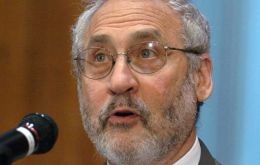MercoPress. South Atlantic News Agency
Stories for September 22nd 2008
-
Monday, September 22nd 2008 - 21:00 UTC
Brazil: ethanol rapidly turning gasoline alternative fuel

Gasoline is rapidly becoming Brazil's alternative fuel as ethanol consumption zooms according to the latest reports from the country's Ministry of Agriculture. The tendency is strongly supported by consumers' demand and Brazil's auto industry.
-
Monday, September 22nd 2008 - 21:00 UTC
Wall Street purge: Mitsubishi buys stake in Morgan Stanley

Japanese banking giant Mitsubishi UFJ Financial Group announced Monday it will buy a stake in troubled Wall Street investment bank Morgan Stanley. The firm said the stake will account for 10% to 20% of Morgan Stanley's common shares.
-
Monday, September 22nd 2008 - 21:00 UTC
Argentine farmers insist on end to CFK “superpowers”

Argentine farm leaders this week end urged the federal government to put an end to the so-called superpowers that allow the Cabinet Chief office to reallocate funds.
-
Monday, September 22nd 2008 - 21:00 UTC
Nuclear powered “Peter the Great” en route to Venezuela

A fleet of Russian warships is heading to Venezuelan waters for joint naval war games in November, the biggest since the end of the Cold War. The fleet left its base at Severomorosk in the Arctic and is headed by a nuclear powered cruiser.
-
Monday, September 22nd 2008 - 21:00 UTC
PM Brown admits mistakes but “I have the experience”

Gordon Brown has admitted he had made mistakes as Britain's Prime Minister and promised: “I will do better”. In an interview ahead of the crucial conference speech on which his future as Prime Minister may depend, Mr Brown insisted he remained the right man to shepherd Britain's economy through global financial turmoil.
-
Monday, September 22nd 2008 - 21:00 UTC
Argentine president talks about the infamous word, inflation
What? Did the Argentine President actually use the “I” word? Yes she said “inflation”. “The first world” President Cristina Fernandez de Kirchner said on Tuesday, “has collapsed like a bubble.” Bubbles? They burst. It is walls that collapse, Mrs. President.
-
Monday, September 22nd 2008 - 21:00 UTC
Expectation with Mrs. Kirchner first UN assembly speech
Argentine President Cristina Fernández de Kirchner is scheduled to attend on Tuesday the official opening and later address the 63rd General Assembly of the United Nations.
-
Monday, September 22nd 2008 - 21:00 UTC
Germany partly blames US and UK for financial turmoil

German chancellor Angela Merkel said that the United States and British governments are partly responsible for the current international financial crisis for having supported markets' resistance to be submitted to voluntary regulations.
-
Monday, September 22nd 2008 - 21:00 UTC
Stiglitz says bailout plan is “monstrous” for US taxpayers

Economy Nobel Prize Joseph Stiglitz described as “monstrous” for US taxpayers the current bail out plan for the financial sector announced by Washington over the weekend.
-
Monday, September 22nd 2008 - 21:00 UTC
Growing concern over soaring Asia-Pacific migration impact
A United Nations-supported meeting opening Monday in Bangkok is closely looking at the impact of migration in Asia and the Pacific – where the number of international migrants has skyrocketed from 28 million to 53 million in just under half a century – on socio-economic development in the region.
